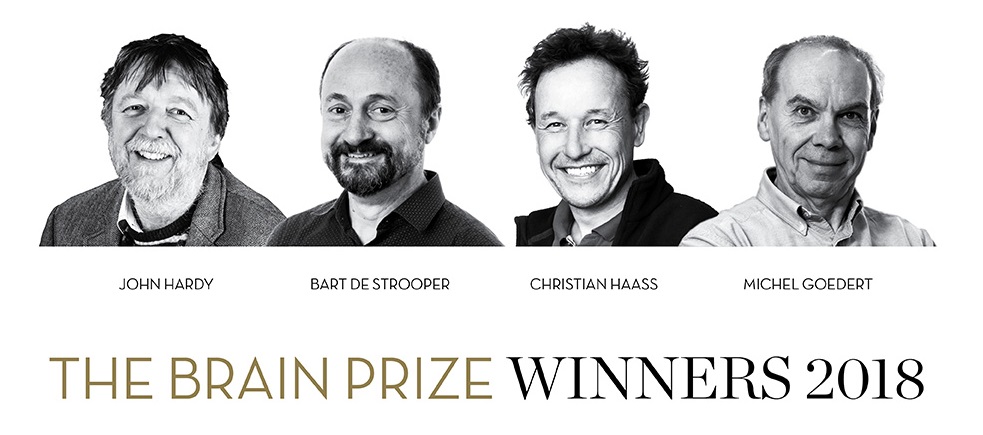Place your votes: BNA Council & Committee elections
22nd July 2024
6th Mar 2018

The BNA would like to congratulate the winners of this year’s Brain Prize, Prof. Bart De Strooper (London and Leuven), Prof. Michel Goedert (Cambridge), Prof. Christian Haass (Munich) and Prof. John Hardy (London) for their groundbreaking research on the genetic and molecular basis of Alzheimer’s disease.
‘We are delighted to see a significant contribution from UK research groups in this year’s award, which also highlights the importance of scientific collaboration across Europe’ said BNA Chief Executive Anne Cooke.
 The one million Euro Brain Prize is annually awarded by The Lundbeck Foundation to active scientists who have provided an exceptional contribution to the field of neuroscience. This year’s Brain Prize winners have individually, and collectively, made essential contributions to the genetic and molecular knowledge of Alzheimer’s disease. Their research lays the foundations for finding new ways to diagnose, treat and possibly even prevent Alzheimer's and other devastating diseases of the ageing brain.
The one million Euro Brain Prize is annually awarded by The Lundbeck Foundation to active scientists who have provided an exceptional contribution to the field of neuroscience. This year’s Brain Prize winners have individually, and collectively, made essential contributions to the genetic and molecular knowledge of Alzheimer’s disease. Their research lays the foundations for finding new ways to diagnose, treat and possibly even prevent Alzheimer's and other devastating diseases of the ageing brain.
This year's prize ceremony will take place on the 9th May in the Royal Danish Library in Copenhagen.
Professor Bart De Strooper is the new Director of the UK Dementia Research Institute, at University College London, and Professor of Molecular Medicine at KU Leuven and VIB, Belgium where he carried out the research that earned him his share of the Brain Prize. Professor De Strooper discovered that presenilin is a protein that ‘cuts’ other proteins into smaller pieces; this is an important and complex process in normal cell signalling (the communication between cells). He found that mutations in presenilin lead to the production of abnormal amyloid which is the main constituent of the plaques in the brains of patients with Alzheimer’s disease.
Professor Michel Goedert is a Programme Leader at the Laboratory of Molecular Biology of the Medical Research Council in Cambridge and an Honorary Professor at Cambridge University. His work using human brain tissues, transgenic mice, cultured cells and purified proteins was instrumental in the discovery – despite considerable initial scepticism – of the importance of Tau protein for Alzheimer’s disease. In his more recent studies, he showed that filamentous Tau clusters can propagate along nerve cell pathways through self-seeding.
Professor Christian Haass is based at the Ludwig-Maximilians-University of Munich and German Centre for Neurodegenerative Disorders. His research into Alzheimer’s has focused on the cascade of events starting with amyloid and progressing through the development of plaques and tangles that eventually kill brain cells and destroy memory. In his recent work, Professor Haass generated mouse models to investigate inflammation in neurodegenerative disorders, which according to his findings may at least initially play a protective role.
Geneticist Professor John Hardy is Chair of Molecular Biology of Neurological Disease at the Institute of Neurology, University College London. After finding mutations in the gene for the amyloid protein in a family with early onset disease, he proposed a ground-breaking ‘amyloid hypothesis’ for Alzheimer’s disease suggesting that disease was initiated by the build-up of this protein in the brain. His discoveries of genetic mutations have had a dramatic impact on understanding not only Alzheimer’s disease but more recently in other neurodegenerative diseases including Parkinson’s disease, progressive supranuclear palsy and motor neuron disease. With his collaborators, their development of transgenic mice that mimic disease process has provided the foundation of clinical trials for drugs to treat these complex conditions.
Click here for further information on this year's winners and The Brain Prize